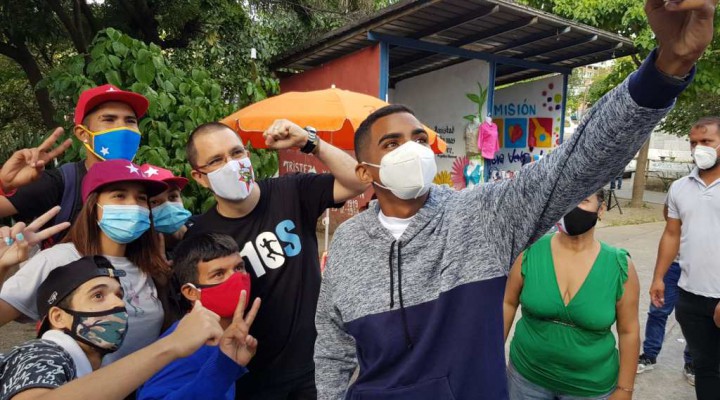Subscribe to get access
Read more of this content when you subscribe today.

At the “Escuela Técnica Comercial Manuel Palacio Fajardo De Caracas Venezuela” in an area called 23 Enero, the Venezuelan Foreign Minister Jorge Arreaza came to vote. The people of the neighbourhood stood in line waiting their turn after being disinfected by the sanitary officers. A few guards were in the background, not interfering with the self-organisation of the population. The Minister Arreaza was later joined by the daughter of Comandante Hugo Chavez, Maria Gabriel, who also came to vote at the same school where the late Chavez used to vote.
It is indeed a normal scene here to see people from all walks of life coming to vote, including the elderly who are barely able to move and are assisted by their relatives. The number of voters is not huge (Only 31%), which is very understandable due to many reasons including the fear the coronavirus restrictions have imposed all over the world. Also, Latin America is used to a low number of participants for the legislation seats (Costa Rica with 24%) but a much higher presence for the presidency. In addition, in the present elections, four of the largest opposition parties had decided to boycott the elections. The opposition who joined the electoral election, however, won 18% of the seats as officially announced.
However, this quality of connections between the people and various government officials is unique and unheard of elsewhere. The interaction and behavior between both sides indicates a strong bond and explains why the majority of the population, notwithstanding the harsh US sanctions impoverishing them, is still holding on and will not turn towards the US.
After he had voted, Jorge Arreaza walked towards the nearby café across the street where people of all ages welcomed him. They were all seated when he came in his black t-shirt (relaxed dress code), without the national television around him which further indicates his move was not for publicity and propaganda. A couple of bodyguards kept their distance to avoid spoiling the interaction. Arreaza greeted each person in the outdoor café and exchanged his fist with everyone, talking to them like a neighbour that they were used to seeing and meet on regular basis.

This was far from being an electoral move because they had already voted: “We see Jorge and other members of the government here in this neighbourhood on a regular basis”, said Diego, a young man who was sitting there and, who asked the Foreign Minister to take a selfie with him.
“If people learn about any corruption or mismanagement in any district, we are informed when we visit and interact with them directly because we need to look after our country and we have been given power only from the people, to act on their behalf. This is the comandante Hugo Chavez’s teaching”, said Minister Arreaza.
The modest behaviour of these officials who are part of the population (and from whom they never distanced themselves) is surprising. The secret of Venezuela is the fact that, on the one hand there are politicians like Juan Guaidó who asked the superpower US for a military intervention against his own people. There are, on the other hand, politicians like President Nicholas Maduro and most of his team who feel they are part of the people and that the power they enjoy emanates from the people who protect them from any harm. Whatever the Venezuelans who are on the opposition side could say, experience or criticise in the government and its President, the fact that their representative called upon a foreign military army to intervene and impose the opposition leaders’ power grab could be considered high treason, to say the least, and was clearly against most of the voters’ wishes, including the will of many other opposition groups. It looks like the nostalgia for colonialism is still hovering over Venezuela.
Read more of this content when you subscribe today.
Venezuela, a population difficult to defeat: Lessons for the Middle East
0 thoughts on “Venezuela, a population difficult to defeat: Lessons for the Middle East”